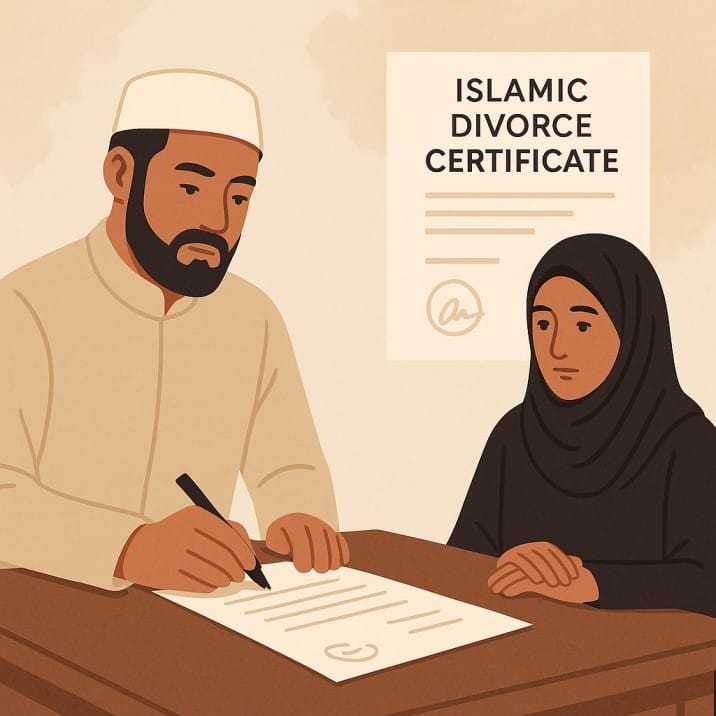Khula In Islam : Khula means Divorce Initiated by Wife

📖 what is Khula in Islam?
In Islam, marriage is a sacred bond between a husband and wife. It is based on love, mercy, respect, and understanding. However, sometimes problems happen in a marriage, and both husband and wife are not happy together. Islam allows solutions in such cases, and Khula is one of them.
Khula is the right of a Muslim woman to ask for a divorce from her husband if she cannot continue living with him for valid reasons. It is a form of separation that is allowed in Islam, but it has proper steps and rules.
💠 Meaning of Khula in Islam
The Arabic word “Khula” (الخلع) means to take off or to remove. In the case of marriage, it means that the wife is removing the bond of marriage with her husband by giving something in return, usually returning the mahr (dowry).
📜 Khula in Quran and Hadith
🕋 In the Holy Quran:
“Then if you fear that they would not be able to keep the limits of Allah, then there is no sin on either of them if she gives back the mahr to get her freedom.”
— Surah Al-Baqarah (2:229)
This verse tells us that if a woman fears she cannot fulfill the rights of her husband or continue the marriage, then she can return the dowry and seek separation.
🕊️ In Hadith:
One famous hadith explains Khula:
A woman named Habibah bint Sahl came to the Prophet Muhammad ﷺ and said, “O Messenger of Allah! I do not blame Thabit for anything in his character or religion, but I do not want to live with him.”
The Prophet ﷺ allowed her to return the garden he gave her as mahr and separated them.
📚 (Sahih Bukhari)
This shows that Khula is allowed if the woman is unhappy, even if the husband is a good man.
Also Read: Best 100 Islamic Quotes 2025 : for Faith, Patience & Gratitude
🧕 When Can a Woman Ask for Khula?
A woman can ask for Khula if:
- She feels unhappy in the marriage.
- She is not able to fulfill her duties as a wife.
- There is no love or peace in the relationship.
- She fears committing sin by staying in the marriage.
- The husband is cruel, abusive, or not fulfilling his responsibilities.
She must have a valid reason, and it should not be used without thinking. Islam teaches that marriage is important, and every effort should be made to save it before choosing Khula.
⚖️ Procedure for Khul’a (Islamic Divorce for Women)
If you wish to apply for Khul’a (marriage dissolution), please read the following process carefully:
1. Submit Your Application
Applicants must attach a separate note explaining the main reasons for seeking Khul’a, along with their application form. It is very important to include a valid contact address or email for your husband.
2. Registration and First Notice
Once your application is received, it will be registered with all relevant details. The Islamic Council (ISC) or Court will then send the first letter to your husband, informing him that you have requested Khul’a. You will also receive a copy of this letter with a reference number for future communication.
If your husband does not reply within given period, a second letter will be sent.
3. No Response from Husband
If there is still no response after the second letter, the Council will ask you to confirm your husband’s address again. If he responds at any stage, both of you will be invited to attend separate meetings with an Islamic scholar / Court. The scholar ? Court will assess your case and prepare a report.
4. Mediation Meeting
A joint meeting will then be arranged with both parties and an ISC ?Court representative. This step is essential for open discussion and fair mediation.
- If a court order prevents this meeting, it will not be held.
- If the wife (applicant) fails to attend, the case may be delayed or closed.
This joint session is not to force reconciliation, but to give both sides a chance to speak, discuss issues like Mahr, and seek closure. If you prefer marriage counselling before deciding, the Council can help arrange it.
Islam gives both men and women the right to end a marriage. An unhappy wife will never be forced to return to her husband.
5. If the Husband Agrees
If the husband agrees to the divorce, he will be asked to sign a formal agreement. Once this is done, an Islamic Divorce Certificate / Or Divorce certifiacte by Court will be issued.

6. If the Husband Refuses or Ignores
If the husband does not respond to either of the letters and refuses to engage, the Council will send a final notice.
You (the wife) will then be asked to confirm whether to move the case to a Panel of Scholars / Court. This panel has the authority to end the marriage through judicial dissolution (Faskh).
Both parties must respect any decisions or conditions set by the Panel. Once approved, an Islamic Divorce Certificate will be provided.
🔄 Difference Between Khula and Talaq
| Khula (خلع) | Talaq (طلاق) |
|---|---|
| Started by the wife | Started by the husband |
| Wife gives back the mahr | Husband does not take anything |
| Needs husband’s or judge’s approval | Husband has full right to give it |
| Done through a legal process | Can be verbal or written |
⏳ Iddah (Waiting Period After Khula)
After Khula, the woman must observe ‘Iddah’, which is a waiting period before she can marry again. The period is usually one menstrual cycle. This is to ensure she is not pregnant and to protect the rights of everyone involved.
💬 Important Points
- Khula is a right of Muslim women, but it should be used with care and honesty.
- It is better to try for reconciliation before taking this step.
- The intention should be pure, not based on temporary anger or small issues.
- Khula is not a sin; it is a solution when marriage becomes harmful or unbearable.
🕌 Final Words
Islam always supports peace, justice, and dignity for both men and women. Khula is a way to protect a woman’s mental, emotional, and spiritual well-being when the marriage cannot continue. It is not shameful, and Islam does not force anyone to stay in a harmful relationship.
If you are facing such a situation, it is best to talk to an Islamic scholar, family elders, or a counselor before making a final decision.


